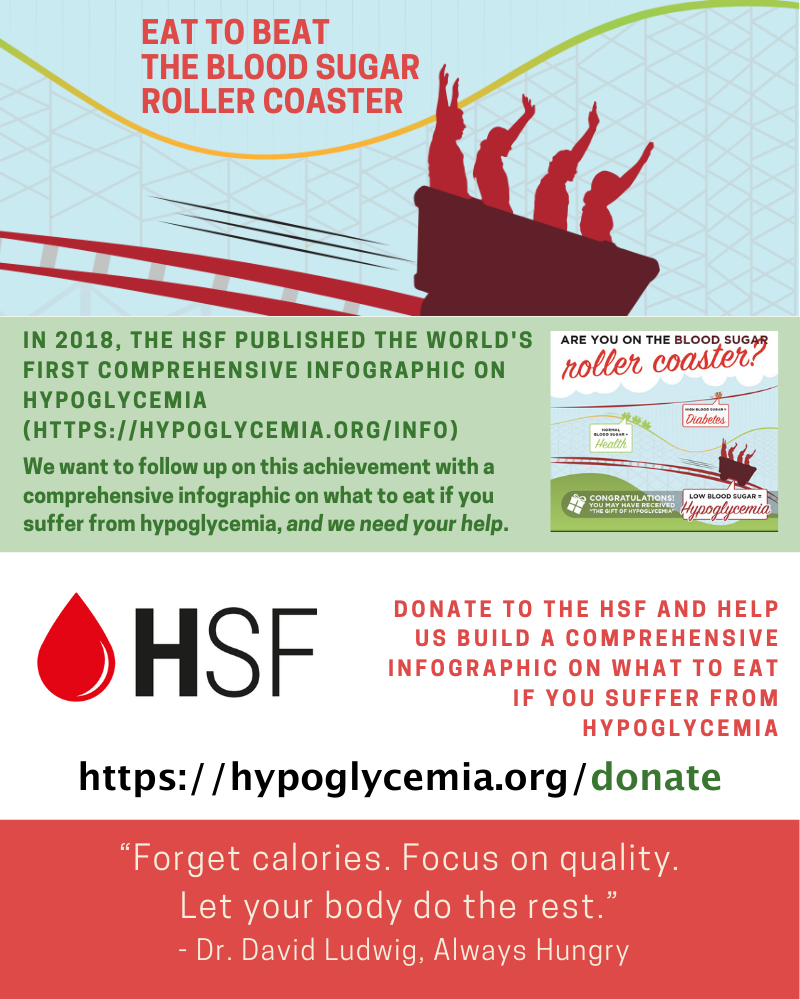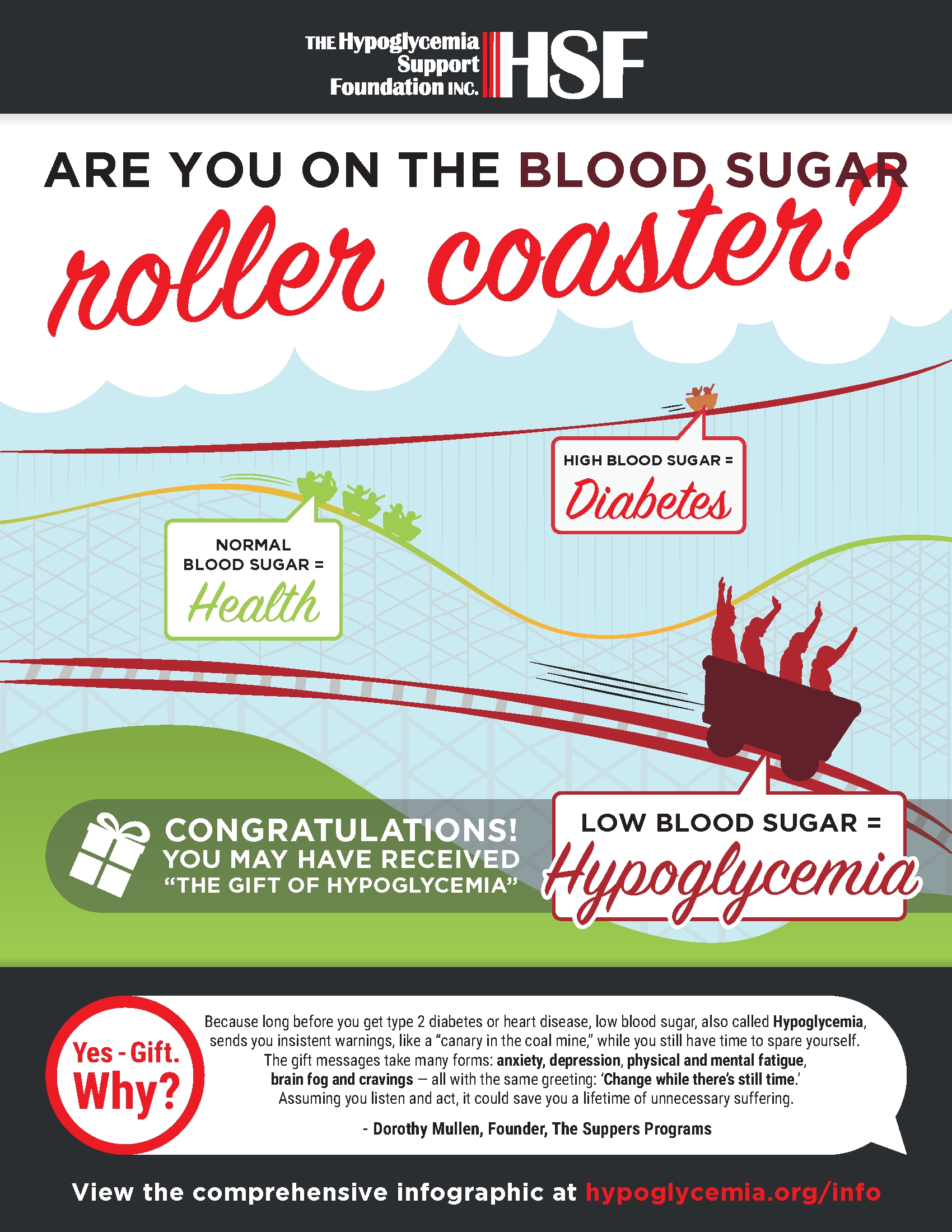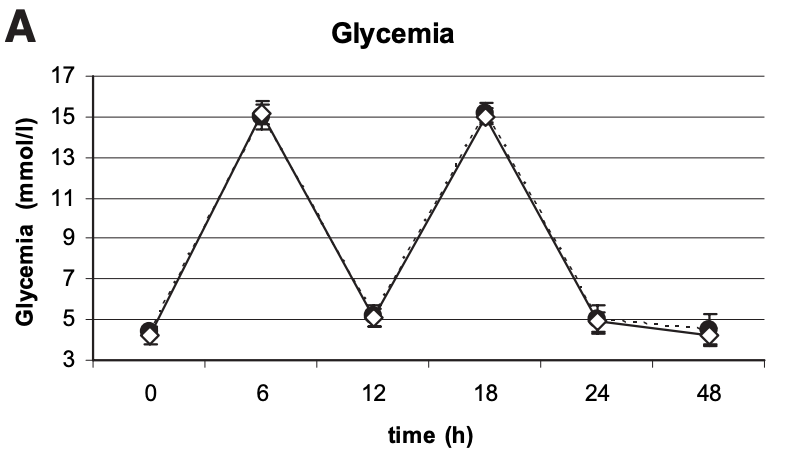
Infographic
Hypoglycemia Infographic
“Hypoglycemia, the Blood Sugar Roller Coaster” infographic educates patients and healthcare professionals about low blood sugar.
To view the infographic in high resolution, please click on the image to view a PDF version.
Want to view this infographic in French?
Want to view this infographic in Spanish?
Want to view this infographic in Arabic?
Want to view this infographic in Hindi?
Help the HSF develop another Infographic!
Click here to check out our campaign to build Eat to Beat the Blood Sugar Roller Coaster:
Here is a handy half-sheet flyer featuring the infographic.
What are the experts saying about the Blood Sugar Roller Coaster infographic?
Hypoglycemia (low-blood sugar) is one of those conditions that is ubiquitous in the patient population, is associated with numerous adjunctive diagnoses, fasting and postprandial states, and has many possible antecedents. The most predominant causes of low-blood sugar are related to diet, stress, lifestyle, and medical conditions. The infographic created by the Hypoglycemia Support Foundation tackles the difficult task of describing hypoglycemia, and provides common-sense advice that can be life-changing for many who may have been told ‘It’s all in your head!’, ‘you have an overactive pancreas’, or ‘just eat more sugar when you feel low’. The infographic allows the patients to do a root cause analysis and develop strategies to gain control of hypoglycemia.
Hypoglycemia is usually unrecognized and often misdiagnosed. This important infographic is a great tool for patients to recognize the signs and symptoms of hypoglycemia and how to care for themselves if they have it. It is especially useful for those who have been told ‘it’s all in your head.
Very few people understand how important it is to have an even flow of energy (glucose) to our cells–especially our brain. I am so happy to see a hypoglycemia website and infographic that provide real solutions for people who experience the blood sugar roller coaster. A busy lifestyle, stress, and fast / processed food lacking nutrients – all wreak havoc on blood sugar and health. It is wonderful to see the resources provided by the Hypoglycemia Support Foundation.
Providing both medical professionals and individuals information about the symptoms, diagnosis and potential treatment option for “hypoglycemia” is so critical. Many individuals have suffered from symptoms for years but never knew they had “hypoglycemia.” This infographic created by HSF provides an education resource that is invaluable to both these individuals and medical professionals. Increased knowledge about hypoglycemia will help prevent more serious metabolic conditions and improve quality of life.
Only 12% of adults in the U.S. are metabolically healthy. Sub-standard metabolic health means people are more likely to develop Type 2 diabetes, cardiovascular disease and other serious health issues. Long before you get diabetes or heart disease, low blood sugar sends a variety of warnings, like a ‘canary in the coal mine.’ This condition is now so widely experienced that it seems “normal” to many – low blood sugar is NOT normal.
Low blood sugar (LBS) or hypoglycemia is a REAL health condition linked with many symptoms that affect your quality of life. Over medication, IS NOT the only cause of LBS. When your body cannot handle blood sugar normally, it can lead to high or low blood sugar. You can help normalize blood sugar, improve energy, control appetite and escape low blood sugar symptoms by eating a healthy nutrition plan that targets LBS (this means consuming mini-meals throughout the day that contain small amounts of fiber-rich low carbohydrate foods). The Hypoglycemia Support Foundation cares and is committed to helping both the public and health professionals recognize the symptoms and provide solutions to treat LBS as a medical condition. Learn more about LBS through this easy to understand infographic. Please join us and share in this educational initiative that will help save lives.
This infographic on hypoglycemia brings a new level of awareness and understanding to a condition that is suffered by many needlessly. Understanding and resolving hypoglycemia requires a holistic approach that looks at diet, lifestyle, stress and medical conditions. The HSF has created an educational resource worthy of sharing with my patients as well as with other doctors.
As a cardiologist, I’m aware hypoglycemia (low blood sugar) can be caused by many possible medical conditions, but diet-related issues are among the leading causes. This new infographic by the Hypoglycemia Support Foundation provides an excellent blend of science, medicine, and practical information that can help sufferers of hypoglycemia see the condition as an opportunity to avoid more serious metabolic conditions – if appropriate actions are taken. I hope healthcare professionals embrace this new educational tool provided by a respected patient advocacy organization.
Hypoglycemia is usually diagnosed as “something else” and most doctors don’t appreciate its impact, therefore people need to be armed with the appropriate information.
I never would have gone sugar free without the tremendous support from the amazing Roberta Ruggiero and the Hypoglycemia Support Foundation.
The Hypoglycemia Support Foundation Infographic is highly informative, offering scope, context, and useful, practical solutions. This should be in the office of doctors and other health professionals offering adjunct guidance for their patients.
As a practicing doctor on a mission to radically extend healthspan and maximize human potential using scientific wellness, technology, educational media, and lifestyle medicine, I’m aware that many suffer from diet-related disease that is entirely preventable. While there are many possible reasons for low blood sugar or hypoglycemia to occur, the leading causes of blood sugar irregularity are clear: diet, stress, lifestyle, and medical conditions. The comprehensive infographic by the Hypoglycemia Support Foundation (HSF) is a huge step forward in educating both patients and health care professionals about the blood sugar roller coaster – and what can be done about it. Kudos to HSF for translating the current science and medicine on this important issue in such an informative and visually appealing manner.
“Blood Sugar Dysregulation – the Blood Sugar Roller Coaster” is the presentation shared by Wolfram Alderson at the May 16, 2019 meeting of the Silicon Valley Health Institute in Palo Alto, CA. The presentation is built off of the Blood Sugar Roller Coaster Infographic.
Oscillating glucose is worse than constant high glucose for endothelial function/oxidative stress.
“We trust that the results of this study… (raise) the alert for a need to avoid glucose oscillation to prevent CVD complications.”
“These data suggest that oscillating glucose can have more deleterious effects than constant high glucose on endothelial function and oxidative stress, two key players in favoring cardiovascular complications in diabetes.”
Oscillating Glucose Is More Deleterious to Endothelial Function and Oxidative Stress Than Mean Glucose in Normal and Type 2 Diabetic Patients. Diabetes, 57(5), 1349–1354. Ceriello, A., Esposito, K., Piconi, L., Ihnat, M. A., Thorpe, J. E., Testa, R., … Giugliano, D. (2008). doi:10.2337/db08-0063
Guide to Preventing the Blood Sugar Roller Coaster
Blood sugar highs and lows—commonly known as the “blood sugar roller coaster”—can lead to fatigue, brain fog, mood swings, and long-term health issues like type 2 diabetes. This guide offers actionable steps to help stabilize your blood sugar levels and improve your metabolic health.
1. Eat Real, Whole Foods
– Avoid Ultra-Processed Foods: Ditch foods with preservatives, additives, and artificial ingredients that spike blood sugar. Replace them with fresh, minimally processed options.
– Focus on Complex Carbohydrates: Opt for whole grains, legumes, and vegetables rich in fiber to slow sugar absorption and avoid spikes.
– Include Healthy Fats and Proteins: These help stabilize blood sugar by slowing digestion and providing sustained energy.
2. Reduce Trigger Substances
-Eliminate Simple Carbs and Sugars: Avoid sugary snacks, pastries, white bread, and sodas.
– Limit Caffeine and Alcohol: Both can disrupt blood sugar balance and contribute to hypoglycemia.
– Stop Smoking: Tobacco affects insulin sensitivity and overall metabolic health.
3. Plan Balanced Meals
– Eat Small, Frequent Meals: Eating every 3-4 hours can prevent sharp drops in blood sugar.
– Prioritize Breakfast: Start the day with a balanced meal rich in protein and healthy fats to set the tone for stable blood sugar.
– Prepare Healthy Snacks: Carry nutrient-dense options like nuts, seeds, or fruit to avoid unhealthy food choices when on the go.
4. Manage Stress
– Practice Relaxation Techniques: Engage in yoga, meditation, journaling, or mindfulness-based stress reduction to lower stress-induced blood sugar fluctuations.
– Get Enough Sleep: Poor sleep increases cortisol levels, which disrupt blood sugar balance.
5. Stay Physically Active
– Moderate Exercise: Walk, do yoga, or engage in mild aerobic exercise to improve insulin sensitivity and maintain energy balance.
– Avoid Over-Exercising: Too much intense exercise can cause blood sugar dips.
6. Monitor and Adjust
– Track Your Diet and Symptoms: Keep a food journal to identify patterns and avoid foods that cause blood sugar spikes or crashes.
– Consider Glucose Monitoring: Continuous glucose monitors (CGMs) provide real-time feedback on how foods affect your blood sugar.
7. Seek Support
– Don’t Do It Alone: Join support groups or work with a healthcare provider to create a sustainable plan.
– Educate Friends and Family: Surround yourself with people who encourage and respect your healthy lifestyle choices.
Key Takeaway
Preventing the blood sugar roller coaster requires a holistic approach that combines a nutrient-dense diet, stress management, physical activity, and self-monitoring. Small, consistent changes can have a big impact on your overall health and well-being.
For more detailed advice, visit resources like [www.hypoglycemia.org](https://www.hypoglycemia.org) for comprehensive dietary suggestions and strategies.





